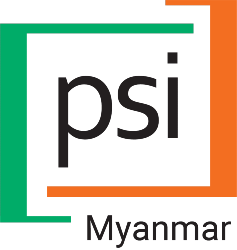JULY 2, 2024
Lan Pya Kyel (LPK) offers HIV-related healthcare services, diagnosis, prevention, and treatment for “key populations” who face much higher rates of HIV and AIDS – female sex workers, gay and transgender populations. LPK operates 12 Key Population Service Centers across Myanmar. These centers are both clinics and community centers, offering health services, counselling as well as safe spaces for community events like social meetings and dance parties. LPK has 200 staff and 190 peer volunteers, over 80% of whom identify as gay or transgender.
Established in 2005 by PSI Myanmar, LPK became a fully independent local entity in 2021 to provide HIV prevention, care and treatment services and TB diagnosis and treatment from providers and government community clinics. As prime partner, PSI provides monitoring and supervision of project activities and donor reporting.
Dr Khin Swe Swe, Executive Director (left) and Dr Wah Wah Thaw, Operations Director (right)
Dr Khin Swe Swe: “In a year, we administer around 43,000 HIV tests to “key populations” (i.e., men who have sex with men, female sex workers and transgender people) and provide treatment and care to 5,000 HIV positive clients. We want to keep expanding our healthcare delivery and roll out innovations to reach UNITAID’s 95/95/95 goal by 2025 – i.e., 95% of those living with HIV will know their status, 95% of those who know their status will be on treatment and 95% of those on treatment will be virally suppressed. Our secret sauce is that we are a “key population”-led, community-based organization. Our peer-led approach has helped us gain the trust of our clients as we work on HIV prevention, care, and treatment services.”

Dr Wah Wah: “Not only did we grapple with COVID, but we also faced severe cash flow constraints given the current political situation in Myanmar. Despite the adversity, we have managed to deliver health services without interruptions. Strong leadership, operational excellence and a very committed workforce has helped us navigate these challenging times.”

Hun Tauk Myo, Senior Counselor, LPK
“I have been at this clinic for 14 years. I find it very rewarding to work with communities that many traditional health providers cannot reach, particularly men who have sex with men (MSM) and female sex workers. I support HIV self-testing and anti-retroviral therapy. On an average day I see 20-30 patients. I put a lot of focus on patient relationships. I have a client who prefers to travel for many hours from the Shan region every month to come to our clinic. A big challenge we face is that the communities we work with (MSM and female sex workers) tend to be mobile. We need to convince them that they need to be on track with their treatment.”
Dr Pyae Sone Win, Medical Officer, LPK
“The best part of my job is supporting my patients from illness to health. However, our patients often come to us very late, which makes our job a lot more difficult. I work with patients with tuberculosis, HIV and various sexually transmitted diseases and support them with diagnosis and treatment. On a typical day I see 30-50 patients. Most of my patients are men who have sex with men (MSM) and sex workers. I also provide family planning services.”


Hsu Lae Yee Noang, Nurse and Drug Dispenser, LPK
“I joined LPK in 2021 after working at a government hospital for 3 years. I love working with a community and colleagues who share my values and ambitions. One challenging part of my job is that I serve a lot of patients daily. This means that I must work very quickly when I am dispensing drugs, but I also cannot afford to make any mistakes.”
Min Thit Sar Aung, Medical Officer, Ma Bayder Clinic
“I joined this clinic in 2021 because I wanted to work with the transgender and MSM (men who have sex with men) community. I provide a wide range of services to my patients from HIV testing and treatment to tuberculosis testing, diagnosis of sexually transmitted diseases and hormonal monitoring and counselling. Many our transgender patients move from place to place because of their profession as sex workers, spiritual dancers, or make-up artists. Also, many of our patients are low-income. They don’t have a phone and struggle to cover the transportation cost for coming to the clinic.”


Khin Kyaw Aye, Case Coordinator, LPK
“I am HIV positive myself and find it fulfilling to give back to my community. When a patient is diagnosed HIV positive, I take down their personal information to create a profile, provide medical counselling on anti-retroviral drugs and follow up with a home visit. I joined LPK in 2014 as a peer educator, left for two years in the middle to get commercial sector experience and then came back again. One challenging aspect of my job is that we recently changed our service delivery model, and this has increased my workload. I am seeing more patients daily.”
Ma La Min Eain, Case Coordinator, LPK
“Before I joined LPK as a service provider in 2017, I was a client at the transgender clinic. I felt safe and understood when I came here as a client, and I could conveniently access the health services I needed. That’s when I knew that I wanted to be part of the transgender clinic team. The most rewarding part of my job is when I see a client following the treatment plan we discussed, getting the medication they need from our clinic and making a recovery. However, many of clients are difficult or stubborn or hard to track down. We must be patient and keep trying.”

AN LPK Consumer’s Journey
Transgender make-up artist Myat Noe Kyaw turned to LPK for support with HIV prevention and to deal with the side effects of improper hormone treatment (Video by PSI Myanmar Communications Team)
